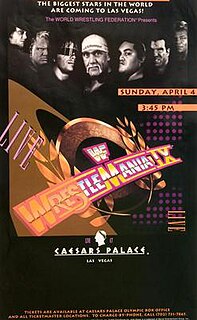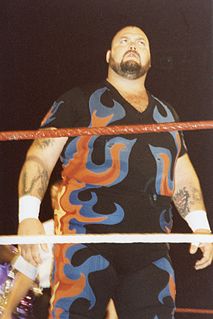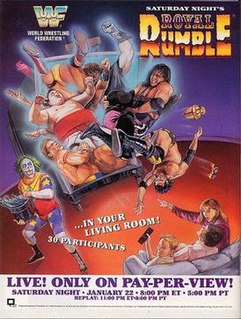
Josip Hrvoje Peruzović, better known by his ring name Nikolai Volkoff, was a Croatian-American professional wrestler best known for his time in the World Wrestling Federation (WWF). Although the character that Volkoff often portrayed was a villainous Russian, Peruzović originated from the former Yugoslavia in real life, now present day Croatia.
A turning point, or climax, is the point of highest tension in a narrative work.

WrestleMania IX was the ninth annual WrestleMania professional wrestling pay-per-view (PPV) event produced by the World Wrestling Federation. The event took place on April 4, 1993, at Caesars Palace in the Las Vegas suburb of Paradise, Nevada. It was the first WrestleMania event held outdoors.

Richard Vigneault is a Canadian former professional wrestler, trainer, and television presenter, better known by his ring name, Rick Martel. He is best known for his appearances with the American Wrestling Association, the World Wrestling Federation and World Championship Wrestling. Championships held by Martel over the course of his career include the AWA World Heavyweight Championship, WCW World Television Championship, and WWF World Tag Team Championship.

Chris Chavis is an American retired professional wrestler currently signed to WWE under a legends contract. He is part of the Lumbee tribe. He is best known for his work with the World Wrestling Federation under the ring name Tatanka from 1991 to 1996 and 2005 to 2007. His ring name is a Lakota word, which means "bison".

Scott Charles Bigelow was an American professional wrestler, better known by the ring name Bam Bam Bigelow. Recognizable by his close to 400-pound frame and the distinctive flame tattoo that spanned most of his bald head, Bigelow was hailed by Ryan Murphy as "the most natural, agile and physically remarkable big man of the past quarter century", while former co-worker Bret Hart described him as "possibly the best working big man in the business."
The Million Dollar Corporation was a professional wrestling stable in the World Wrestling Federation (WWF) from April 1994 to May 1996 and was led and managed by the "Million Dollar Man" Ted DiBiase. DiBiase had retired from active competition after a back injury in a match for All Japan Pro Wrestling in late 1993 and was brought back by the WWF as a manager.
Duane Gill is an American retired professional wrestler, best known for his appearances in the World Wrestling Federation (WWF) during the Attitude Era under the ring name Gillberg, a parody of then-rival promotion World Championship Wrestling's top star Goldberg. During his tenure in the WWF, Gill became a one-time Light Heavyweight Champion. He held the title for 15 months, becoming the longest reigning Light Heavyweight Champion as recognized by WWE. Gill retired on February 28, 2020.

The 1993 SummerSlam was the sixth annual SummerSlam professional wrestling pay-per-view (PPV) event produced by the World Wrestling Federation (WWF). It took place on August 30, 1993, at The Palace of Auburn Hills in Auburn Hills, Michigan. Eleven matches were contested at the event, including one dark match held before the live broadcast.

The 1994 SummerSlam was the seventh annual SummerSlam professional wrestling pay-per-view (PPV) event produced by the World Wrestling Federation. It took place on August 29, 1994, at the United Center in Chicago, Illinois, which had opened eleven days earlier. Eight matches were contested at the event, including one dark match held before the live broadcast.

The 1995 Royal Rumble was the eighth annual Royal Rumble professional wrestling pay-per-view (PPV) event produced by the World Wrestling Federation. It took place on January 22, 1995, in the USF Sun Dome located in Tampa, Florida. The event featured five matches on its card. As has been customary since 1993, the Royal Rumble match winner received a world championship match at that year's WrestleMania. For the 1995 event, the winner received a match for the WWF World Heavyweight Championship at WrestleMania XI.

The 1994 Royal Rumble was the seventh annual Royal Rumble professional wrestling pay-per-view event produced by the World Wrestling Federation. It took place on January 22, 1994, at the Providence Civic Center in Providence, Rhode Island. Six matches were contested at the event, including one dark match.

The 1992 Survivor Series was the sixth annual Survivor Series professional wrestling pay-per-view (PPV) event produced by the World Wrestling Federation. It took place on November 25, 1992, at the Richfield Coliseum in Richfield Township, Ohio. It was the first Survivor Series that broke away from the traditional four on four survivor team matches and had typical one-on-one and tag-team matches instead.

The 1993 Survivor Series was the seventh annual Survivor Series professional wrestling pay-per-view (PPV) event produced by the World Wrestling Federation. It took place on Thanksgiving Eve on November 24, 1993, at the Boston Garden in Boston, Massachusetts. Six matches were contested at the event, including one dark match before the live broadcast.

In Your House was the inaugural In Your House professional wrestling pay-per-view (PPV) event produced by the World Wrestling Federation. The event took place on May 14, 1995, at the Onondaga County War Memorial in Syracuse, New York. The In Your House series was established to be held as monthly PPVs to take place between the WWF's "Big Five" PPVs at the time: WrestleMania, King of the Ring, SummerSlam, Survivor Series, and Royal Rumble.

The 1995 King of the Ring was the third annual King of the Ring professional wrestling pay-per-view (PPV) event produced by the World Wrestling Federation that featured the ninth King of the Ring tournament. It took place on June 25, 1995, at the CoreStates Spectrum in Philadelphia, Pennsylvania. This pay-per-view is somewhat notorious among WWE fans as it is considered one of the worst ever pay-per-views produced by the company.

The 1994 King of the Ring was the second annual King of the Ring professional wrestling pay-per-view (PPV) event produced by the World Wrestling Federation that featured the eighth King of the Ring tournament. It took place on June 19, 1994, at the Baltimore Arena in Baltimore, Maryland. The tournament to determine which wrestler would be crowned King of the Ring actually began the month before the pay-per-view, as the wrestlers gained entry in the tournament by participating in qualifying matches. These matches were held throughout May 1994 on WWF television programs, although the WWF did not explain how wrestlers were selected to compete in the qualifying matches. The second, third, and fourth rounds of the tournament were televised on the pay-per-view broadcast on June 19.

The 2006 No Way Out was the eighth No Way Out professional wrestling pay-per-view (PPV) event produced by World Wrestling Entertainment (WWE). It was held exclusively for wrestlers from the promotion's SmackDown! brand division. The event took place on February 19, 2006, at the 1st Mariner Arena in Baltimore, Maryland. The official theme song was "Deadly Game" by Theory of a Deadman.

The 1993 King of the Ring was the inaugural King of the Ring professional wrestling pay-per-view (PPV) event produced by the World Wrestling Federation that featured the seventh King of the Ring tournament. It was the first of 10 King of the Ring events that were produced as a pay-per-view; an 11th was produced exclusively as a WWE Network event. The event resulted from the WWF's decision to make its annual King of the Ring tournament into a televised event. It took place on June 13, 1993, at the Nutter Center in Dayton, Ohio. The card featured ten matches, which resulted from scripted storylines and had results predetermined by the WWF.
March to WrestleMania is a professional wrestling television program that was produced by the World Wrestling Federation (WWF). Three separate specials aired on the USA Network, one week prior to that years respective WrestleMania and Survivor Series Showdown before Survivor Series.















